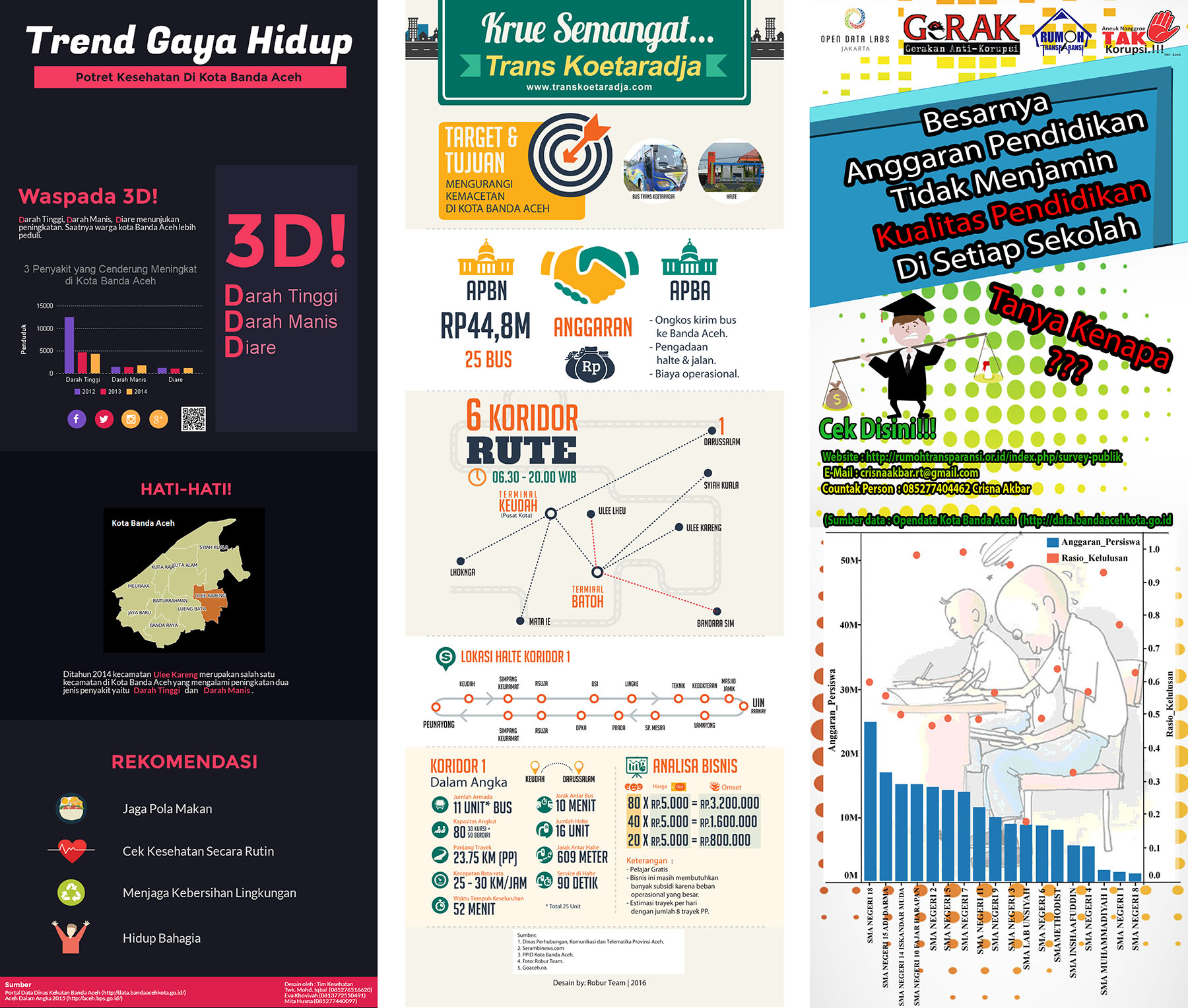My passion for open data almost rivals that of my passion for coffee. Almost, because nothing beats good, fresh, strong coffee. So naturally, it’s a win-win experience for me when these two could meet – even abstractly – through one of our projects!
Banda Aceh’s taking big steps towards becoming an open data champion
Banda Aceh is a city that has a lot going for it: great coffee, delicious food, and breathtaking nearby places to visit. Topping this, another notable aspect of the city is that it’s one of the Indonesian cities working towards increased transparency and openness to allow for more citizen engagement through its open data initiative.
This city’s initiative, and with it our project in Banda Aceh, started from the education sector, spread to health and other fields, and is now focused on the drafting of a Mayor’s Regulation (Peraturan Walikota). The drafting process was initiated after seeing the clear need for a legal framework for building better and more sustainable data management practices in Banda Aceh. Informed by the International Open Data Charter’s principles and working in collaboration with the local CSO GeRAK Aceh, at the core of the revised city government’s data management system will be an automatic linking of government-used applications that generate data to the city’s open data portal.
How we’re making open data matter
In addition to the technical assistance provided to the city government, in the past months we’ve also enabled citizens in Banda Aceh to make use of open data through so-called “Data Processing Trainings”. The way we see it, when civil society, activists and small businesses have access to data that show conditions of public service and are able to use it, they can influence policy-making and work with city officials to improve these very services and tackle urban challenges more effectively.
Throughout the project, we’ve seen the need for close collaboration between open data advocates, CSOs, and other communities – such as “tech” or ICT groups and bloggers. To address this, we held the first part of the Data Processing Training last December 2015 intent on fostering collaboration among those communities through capacity-building for data scraping, data cleaning and data visualisation. The main activities were:
- The participants were familiarised with open government data from the portal and trained in basic data processing skills.
- Infographic experts from Selasar and Tempo shared their knowledge in creating digital media and graphics based on open data using online tools.
- To broaden the reach of these infographics, journalists from Tempo and the Indonesian Journalists Association (AJI) in Banda Aceh explained how to communicate with the wider public through offline and online media.
- At the end of the training, participants from CSOs, tech community and bloggers’ network committed to working in groups to produce visual or textual results of data use from the education, health and transportation sectors. These will be later disseminated to the citizens of Banda Aceh.
- Following up on this, we conducted an on-site mentoring for the groups to help them polish their outputs from three months of hard-work and prepare it for publication and circulation. All groups successfully completed their small data-usage projects!
What I’ve learned
I’ve been knee-deep involved in the Banda Aceh project since joining the Lab. From informal chats in coffee shops to panel discussions, I’ve supported dialogues between government, CSOs, and other communities. Here are some key insights I’ve gathered from this experience:
- The “Responsive Open Data Model” works really well. It’s a non-conventional approach where citizens are consulted on what data and information matter to them, and the government responds by opening data from these priority themes.
- You need close collaboration between stakeholders – within government and CSOs – to make open data initiatives work. This is a bitter coffee to swallow, but without the commitment of all parties, open data initiatives often get stuck (and fade away) in the ‘data-supply’ or ‘data-demand’ steps.
- Open data practices are only sustainable when there are regulatory frameworks on data management and open data in place—at least in Indonesia. There are a number of reasons why open data is still not a norm in some countries, and although it’s best to assuage concerns, having regulations and laws in place is a good start for compelling governments to open much needed data and thereby supporting open data practices.
- As with all group efforts, participants and their work – from processes to skills – should complement and be at par with each other. This is why capacity-building matters.
- Making cities open – fueled by open data – take a lot of time and effort to even just get started, and even more time and effort to grow. Banda Aceh, for instance, is slowly turning into an open city—although it still has a long way to go.
To open data and beyond!
Before the year’s end, the groups from our Data Processing Trainings will present their work to the city government in Banda Aceh. These outputs will hopefully provide new inputs to the government, and fuel more proactive opening of data through open data portal.
We at the Lab expect this activity to kick-start future collaborations, which we hope to develop and incubate through our newly-launched project, “Innovating for Open Cities”. The project is designed to harness the potential of open data to turn the rapidly-increasing number of Smart Cities into Open Cities—a journey that has just started for Banda Aceh.
To know more about our activities in Banda Aceh and elsewhere, visit our project pages. Keep updated on our activities through our blog, or follow us on Twitter @ODLabJkt and connect with me @3clair!

Leave a Reply